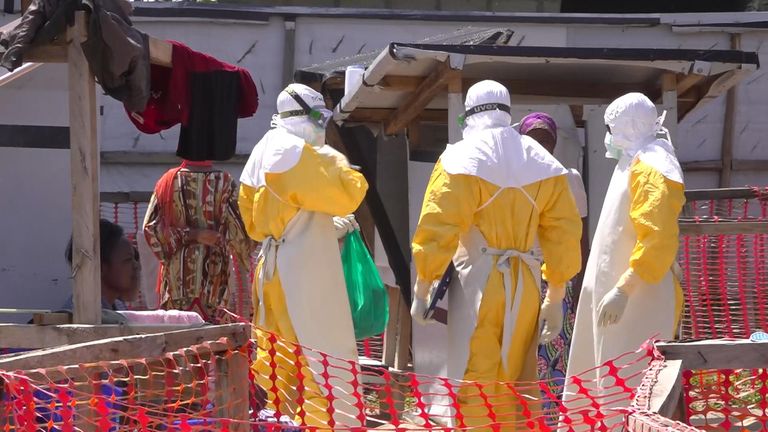Home » World News »
Deadly Ebola outbreak in DR Congo ‘now a global emergency’
An Ebola outbreak in the Democratic Republic of Congo now constitutes a global public health emergency, the World Health Organisation (WHO) has said.
Some 1,650 people have lost their lives as government officials and international aid agencies have struggled to contain the virus over the past year, with fears it could spread within a major city in the central African country.
WHO said concerns over the death of a 46-year-old pastor in Goma, which is home to 1.5 million people, had resulted in the heightened threat level.
Sky News understands the pastor travelled for three days in a bus before he reached the bustling city, and surveillance teams have only traced eight of his 18 or more fellow passengers.
Experts say it would be extremely difficult to control an outbreak in a place like Goma, and the upgraded crisis status should see more specialists and resources arrive to combat the virus.
But despite the outbreak being classified as a global emergency, and WHO reporting a new case of the virus in neighbouring Uganda on Wednesday, no restrictions on travel or trade will be introduced.
There will also be no entry screening of passengers at ports or airports outside the immediate region.
WHO chief Tedros Adhanom Ghebreyesus said the recommendations had been made by a committee of international experts, which stressed there was no need to introduce any restrictions outside Congo.
The ongoing outbreak is among the worst in history, and the battle to combat the virus has not been helped by armed assailants having targeted several centres set up to treat those infected.
Last December, Sky News visited a similar centre set up in the city of Beni, where 200 health workers were tasked with treating those admitted.
They erected a series of innovative, air-conditioned tents to house and treat the most serious cases, but there is no cure for the disease, which kills more than half of those it infects.
The deadliest outbreak ever was an unprecedented crisis in West Africa, which killed more than 11,000 people between 2013 and 2016.
Source: Read Full Article



